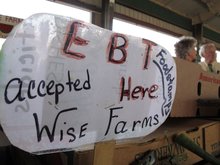0
Interactive
Community:
This decision-support tool enables you to exhibit economic conditions among communities in the Portland-Vancouver region and it provides a data picture of the regional economy to align investments that achieve the coordinated vision of Greater Portland 2020, the 2040 Growth Concept, the Regional Transportation Plan, and Metro’s six desired outcomes, focused on ensuring current and future residents benefit from the region’s sustained economic competitiveness and prosperity.
Authored by: Oregon Metro
Topics: Community development, Low-income, Racial inequalities
 Shared by Mica O'Brien
Shared by Mica O'Brien
Mica O'Brien posted a
on Feb 28, 2019
This decision-support tool enables you to exhibit economic conditions among communities in the Portland-Vancouver region and it provides a data picture of the regional economy to align investments that achieve the coordinated vision of Greater Portland 2020, the 2040 Growth Concept, the Regional Tra
0
Publication
Community:
Feb 15, 2019
Despite that consensus, the digital divide is about to get worse, and current policies will exacerbate it. We need to replace those policies with a coordinated approach that provides appropriate incentives for all stakeholders to bridge widening gaps.
Authored by: Blair Levin for The Brookings Institution
Topics: Broadband, Legislation & Policy, Low-income, Racial inequalities
 Shared by Mica O'Brien
Shared by Mica O'Brien
Mica O'Brien posted a
on Feb 28, 2019
Blair Levin for The Brookings Institution
Despite that consensus, the digital divide is about to get worse, and current policies will exacerbate it. We need to replace those policies with a coordinated approach that provides appropriate incentives for all stakeholders to bridge widening gaps.
0
Publication
Community:
Feb 22, 2019
The development of new digital telecommunications capabilities combined with a persistent digital divide leaves the public sector with enormous responsibilities to promote network quality and deliver equitable access—but it can only do so by sensibly splitting regulatory responsibilities between the national and local levels. Unfortunately, news out of Washington, D.C. reveals the federal government has overstepped its appropriate role, constricting local governments’ abilities to craft locally tailored solutions.
Authored by: Blair Levin for The Brookings Institution
Topics: Broadband, Community development, Legislation & Policy, Low-income
 Shared by Mica O'Brien
Shared by Mica O'Brien
Mica O'Brien posted a
on Feb 28, 2019
Blair Levin for The Brookings Institution
The development of new digital telecommunications capabilities combined with a persistent digital divide leaves the public sector with enormous responsibilities to promote network quality and deliver equitable access—but it can only do so by sensibly splitting regulatory responsibilities between the
0
Video
Community:
Feb 20, 2019
With the active support of their residents, HABG converted a 34-passenger bus donated by Warren County Public Schools. The new mobile grocery store will offer fresh fruits and vegetables to families who currently live in a 'food desert' where the cost of eating healthy can be beyond their reach.
HAGB's new mobile grocery store will visit public housing developments and other low-income neighborhoods in Bowling Green to help residents lower their food costs by offering affordable groceries, including fresh produce grown at HAGB. More than 90 residents were surveyed and almost everyone said they would use the mobile grocery store at least once weekly.
Authored by: Housing Authority of Bowling Green
Topics: Food insecurity, Health, Housing, Low-income, Nutrition, Place-based
 Shared by Housing Is
Shared by Housing Is
Housing Is posted a
on Feb 28, 2019
Housing Authority of Bowling Green
With the active support of their residents, HABG converted a 34-passenger bus donated by Warren County Public Schools.
0
Publication
Community:
Jan 31, 2019
For many years, the vulnerabilities of children experiencing homelessness have been glossed over on the assumption that their innate resilience would overcome the impact of homelessness. As someone who worked in the field, I would often hear, “Oh, they’ll never remember.” Today we know better. We know more about how the brain develops and about how trauma impacts brain development. There is a growing recognition among providers that these early years are critical for establishing a foundation for emotional, mental, and physical wellbeing, and that we don’t get a second chance at early childhood.
Authored by: Carol Klocek for SchoolHouse Connection
Topics: Early childhood, Education, Homelessness, Housing, Low-income, Research, Safety, Stability
 Shared by Housing Is
Shared by Housing Is
Housing Is posted a
on Feb 21, 2019
Carol Klocek for SchoolHouse Connection
For many years, the vulnerabilities of children experiencing homelessness have been glossed over on the assumption that their innate resilience would overcome the impact of homelessness. As someone who worked in the field, I would often hear, “Oh, they’ll never remember.” Today we know better.
0
Research
Community:
Feb 20, 2019
As the US Department of Housing and Urban Development (HUD) prioritizes programs to help households receiving rental assistance achieve economic self-sufficiency, researchers, policymakers, and advocates debate the utility of work requirements as an effective pathway toward economic self-sufficiency and the risks of offering rental assistance on a conditional basis. This study contributes additional evidence suggesting that work requirements, when implemented gradually and in context with hardship exemptions and local supports, can boost annual household income, earnings, and the adult-employment ratio* for low-income households with no work history. But work requirements have little effect on those with prior earnings.
Authored by: Han Bum Lee and Paul E. McNamara for Housing Policy Debate (How Housing Matters, Urban Institute)
Topics: Asset building, Housing, Legislation & Policy, Low-income, Research, Workforce development
 Shared by Housing Is
Shared by Housing Is
Housing Is posted a
on Feb 21, 2019
Han Bum Lee and Paul E. McNamara for Housing Policy Debate (How Housing Matters, Urban Institute)
As the US Department of Housing and Urban Development (HUD) prioritizes programs to help households receiving rental assistance achieve economic self-sufficiency, researchers, policymakers, and advocates debate the utility of work requirements as an effective pathway toward economic self-sufficiency
0
Case study
Community:
The Addressing Healthcare’s Blindside in Albuquerque’s South Side (AHBASS) collaborative participated in the BUILD Health Challenge’s first cohort with the intention of “making the healthy choice, the easy choice” for community members. Now you can learn about their strategies, approaches, application of the BUILD principles, and outcomes in this new case study documenting their work. Follow along in this case study and see how this Albuquerque, NM, based team addressed chronic disease and self-management in their community. Together, they established a multi-sector collaboration that resulted in a referral tracking system and a Mobile Farmers Market. In addition, the team implemented the Healthy Here Wellness Referral Center, an integrated chronic disease management referral system to link clinics to community resources in order to improve health outcomes.
Authored by: The BUILD Health Challenge
Topics: Data sharing, Food insecurity, Health, Low-income, Nutrition, Partnerships
 Shared by Mica O'Brien
Shared by Mica O'Brien
Mica O'Brien posted a
on Feb 20, 2019
The BUILD Health Challenge
The Addressing Healthcare’s Blindside in Albuquerque’s South Side (AHBASS) collaborative participated in the BUILD Health Challenge’s first cohort with the intention of “making the healthy choice, the easy choice” for community members.
0
Report
Community:
Feb 19, 2019
Integrating health care data with data from other sectors helps address the holistic needs of individual patients while informing the development of population-level programs and policies that can improve outcomes, both in health care and other sectors. This paper provides guidance for those in non-health care sectors (e.g. housing, social services, community-based organizations) on effectively engaging and advancing conversations with health care stakeholders about collaborating to share data, focusing on the specific stakeholder of hospitals/health systems.
Authored by: Data Across Sectors for Health (DASH)
Topics: Health, Housing, Low-income, Medicaid / Medicare, Partnerships
 Shared by Mica O'Brien
Shared by Mica O'Brien
Mica O'Brien posted a
on Feb 20, 2019
Data Across Sectors for Health (DASH)
Integrating health care data with data from other sectors helps address the holistic needs of individual patients while informing the development of population-level programs and policies that can improve outcomes, both in health care and other sectors.
0
News Article
Community:
Feb 19, 2019
A glossary for the emerging Democratic health care debate.
Authored by: Margot Sanger-Katz for The New York Times
Topics: Health, Legislation & Policy, Low-income, Medicaid / Medicare, Seniors
 Shared by Mica O'Brien
Shared by Mica O'Brien
Mica O'Brien posted a
on Feb 19, 2019
Margot Sanger-Katz for The New York Times
A glossary for the emerging Democratic health care debate.
0
News Article
Community:
Dec 3, 2018
Sen. Ben Allen (D-Santa Monica) wants to eliminate Article 34 of the state Constitution, which requires a citywide public vote before new low-income housing projects that receive public funding are built. The provision was added to the Constitution through a ballot initiative in 1950, and Allen said it was a relic in need of repeal.
Authored by: Liam Dillon for the Los Angeles Times
Topics: Housing, Legislation & Policy, Low-income, West Coast
 Shared by Mica O'Brien
Shared by Mica O'Brien
Mica O'Brien posted a
on Feb 19, 2019
Liam Dillon for the Los Angeles Times
Sen. Ben Allen (D-Santa Monica) wants to eliminate Article 34 of the state Constitution, which requires a citywide public vote before new low-income housing projects that receive public funding are built.
0
Research
Community:
What is source of income discrimination, and who are the Rhode Islanders affected by it? The federal Fair Housing Act prohibits housing discrimination on the basis of race, color, religion, national origin, familial status, sex, and disability. Rhode Island state law goes further, granting residents additional rights. Yet both still allow landlords to reject a prospective tenant based solely on where his or her income comes from, even when the applicant can lawfully pay the requested rent.
Authored by: SouthCoast Fair Housing
Topics: East Coast, Housing, Low-income, Racial inequalities, Research
 Shared by Mica O'Brien
Shared by Mica O'Brien
Mica O'Brien posted a
on Feb 19, 2019
What is source of income discrimination, and who are the Rhode Islanders affected by it? The federal Fair Housing Act prohibits housing discrimination on the basis of race, color, religion, national origin, familial status, sex, and disability.
0
Podcast
Community:
Feb 14, 2019
John King served in President Barack Obama’s cabinet as the 10th U.S. Secretary of Education. Secretary King is one of the most prominent voices on the connections between housing policy and education policy, particularly with respect to pervasive socioeconomic and racial segregation. We sat down with Secretary King in Los Angeles to discuss the state of modern-day school and housing segregation, why he prioritized integration while in office, promising practices on both the education and housing fronts, and why education advocates must also be housing advocates.
“As citizens, we need to be engaged on the issues that affect the kids and families that we serve,” said Secretary King. “We have to be engaged on housing…We have a responsibility as educators to be engaged across a range of issues.”
Authored by: Opportunity Starts at Home
Topics: Child welfare, Education, Homelessness, Housing, Legislation & Policy, Low-income, Partnerships, Youth
 Shared by Mica O'Brien
Shared by Mica O'Brien
Mica O'Brien posted a
on Feb 19, 2019
Opportunity Starts at Home
John King served in President Barack Obama’s cabinet as the 10th U.S. Secretary of Education. Secretary King is one of the most prominent voices on the connections between housing policy and education policy, particularly with respect to pervasive socioeconomic and racial segregation.
0
News Article
Community:
Feb 8, 2019
The Battered Women’s Shelter in Akron has gotten funding from HUD to cover rent and other living expenses for domestic violence victims after they leave shelters for the past decade. HUD has now approved $1.7 million to be distributed to other Ohio cities for this purpose.
Authored by: Stephanie Warsmith for Akron Beacon Journal/Ohio.com
Topics: Domestic violence, Funding, Homelessness, Housing, Legislation & Policy, Low-income, Midwest
 Shared by Mica O'Brien
Shared by Mica O'Brien
Mica O'Brien posted a
on Feb 19, 2019
Stephanie Warsmith for Akron Beacon Journal/Ohio.com
The Battered Women’s Shelter in Akron has gotten funding from HUD to cover rent and other living expenses for domestic violence victims after they leave shelters for the past decade. HUD has now approved $1.7 million to be distributed to other Ohio cities for this purpose.
1
News Article
Community:
Feb 7, 2019
When we stereotype or lazily assume low-wage workers to be “low skill,” it reinforces an often unspoken and pernicious view that they lack intelligence and ambition, maybe even the potential to master “higher-order” skilled work. In an economy that is supposed to operate as a meritocracy—but rarely does—too often, we see low wages and assume both the work and workers are low-value. This bias makes us overlook people for better-paying positions in which they might have excelled, hindering their social mobility.
Authored by: Byron Auguste for Forbes
Topics: Asset building, Low-income, Racial inequalities, Workforce development
 Shared by Housing Is
Shared by Housing Is
Housing Is posted a
on Feb 19, 2019
When we stereotype or lazily assume low-wage workers to be “low skill,” it reinforces an often unspoken and pernicious view that they lack intelligence and ambition, maybe even the potential to master “higher-order” skilled work.
0
Interactive
Community:
More tan 1.3 million homeless students K-12 have been identified in America's public schools.
Authored by: SchoolHouse Connection, Civic Enterprises, America's Promise Alliance, and Institute for Children, Poverty and Homelessness
Topics: Child welfare, Education, Homelessness, Housing, Legislation & Policy, Low-income, Youth
 Shared by Mica O'Brien
Shared by Mica O'Brien
Mica O'Brien posted a
on Feb 14, 2019
SchoolHouse Connection, Civic Enterprises, America's Promise Alliance, and Institute for Children, Poverty and Homelessness
More tan 1.3 million homeless students K-12 have been identified in America's public schools.
0
News Article
Community:
Feb 12, 2019
The Board of Supervisors on Tuesday gave the green light for San Diego County to apply for up to $125 million in state funding to help people get off the streets and receive mental health treatment.
Authored by: Alexander Nguyen for Times of San Diego
Topics: Funding, Homelessness, Housing, Legislation & Policy, Low-income, Mental health, Stability, Substance abuse, West Coast
 Shared by Mica O'Brien
Shared by Mica O'Brien
Mica O'Brien posted a
on Feb 14, 2019
Alexander Nguyen for Times of San Diego
The Board of Supervisors on Tuesday gave the green light for San Diego County to apply for up to $125 million in state funding to help people get off the streets and receive mental health treatment.
0
News Article
Community:
Feb 12, 2019
As the previous shutdown lingered, officials worried what running out of money could mean for 1.1 million low-income households.
Authored by: Amanda Abrams for yes!
Topics: CLPHA, Funding, Housing, Legislation & Policy, Low-income
 Shared by Mica O'Brien
Shared by Mica O'Brien
Mica O'Brien posted a
on Feb 14, 2019
As the previous shutdown lingered, officials worried what running out of money could mean for 1.1 million low-income households.
0
Report
Community:
Jan 16, 2019
This report identifies services that help low-income individuals and households achieve upward economic mobility and explores how affordable housing providers offer them. We begin by presenting key economic mobility concepts and definitions. We then discuss the research evidence on interventions across sectors and disciplines that help individuals and households to achieve upward economic mobility. In the third section of this report, we present our findings from interviews with leading organizations and initiatives in the field. Finally, we discuss challenges for affordable housing providers seeking to help their residents achieve economic mobility and opportunities for future research.
Authored by: Eric Burnstein, Megan Gallagher, and Wilton Oliver for the Urban Institute
Topics: Asset building, Housing, Legislation & Policy, Low-income, Research, Workforce development
 Shared by Housing Is
Shared by Housing Is
Housing Is posted a
on Feb 14, 2019
Eric Burnstein, Megan Gallagher, and Wilton Oliver for the Urban Institute
This report identifies services that help low-income individuals and households achieve upward economic mobility and explores how affordable housing providers offer them. We begin by presenting key economic mobility concepts and definitions.
0
Research
Community:
Feb 5, 2019
Baltimore is the 30th-largest US city by population and is a study in contrasts. It has a low average income compared with other wealthy Northeast cities, has nine colleges and universities, and is a magnet for people pursuing higher education but has undergone decades of population loss. A large social sector provides important services to residents and buoys the local economy: nearly every third job in the city is with a nonprofit employer. But this also illustrates the city’s limited economic vibrancy. This mix of market and nonmarket forces makes Baltimore an important place to examine the geography of opportunity in an American city.
Authored by: The Urban Institute
Topics: Community development, East Coast, Housing, Low-income, Racial inequalities, Research
 Shared by Housing Is
Shared by Housing Is
Housing Is posted a
on Feb 14, 2019
Baltimore is the 30th-largest US city by population and is a study in contrasts. It has a low average income compared with other wealthy Northeast cities, has nine colleges and universities, and is a magnet for people pursuing higher education but has undergone decades of population loss.
0
Report
Community:
Feb 13, 2019
More low-income children across the country are getting the nutrition they need to learn and thrive through the School Breakfast Program, according to the annual School Breakfast Scorecard, released by the Food Research & Action Center (FRAC).
Authored by: Food Research & Action Center (FRAC)
Topics: Child welfare, Food insecurity, Health, Low-income, Nutrition
 Shared by Housing Is
Shared by Housing Is
Housing Is posted a
on Feb 14, 2019
Food Research & Action Center (FRAC)
More low-income children across the country are getting the nutrition they need to learn and thrive through the School Breakfast Program, according to the annual School Breakfast Scorecard, released by the Food Research & Action Center (FRAC).
0
Webinar
Community:
Feb 12, 2019
During CLPHA’s Education Working Group Webinar on addressing school attendance at PHAs, representatives from the King County Housing Authority and the national nonprofit Attendance Works presented on tools for addressing chronic absenteeism, as well as strategies for fostering a culture of attendance among residents.
Authored by: CLPHA, Housing Is
Topics: Attendance, CLPHA, Dual-generation, Education, Housing, Housing Is Working Group, Low-income, Metrics, Partnerships, Place-based
 Shared by Housing Is
Shared by Housing Is
Housing Is posted a
on Feb 12, 2019
During CLPHA’s Education Working Group Webinar on addressing school attendance at PHAs, representatives from the King County Housing Authority and the national nonprofit Attendance Works presented on tools for addressing chronic absenteeism, as well as strategies for fostering a culture of attendanc
0
News Article
Community:
Jan 30, 2019
FRESNO COUNTY, California - Research shows that a child's enviornment, where they live, can have a huge impact on the outcome of their education. We take a look at how Fresno County's philosophy about public housing is having a positive impact on families.
Authored by: Juanita Stevenson for yourvalley.com
Topics: Broadband, CLPHA, Education, Housing, Low-income, Out-of-school time, Research, Youth
 Shared by Mica O'Brien
Shared by Mica O'Brien
Mica O'Brien posted a
on Feb 11, 2019
Juanita Stevenson for yourvalley.com
FRESNO COUNTY, California - Research shows that a child's enviornment, where they live, can have a huge impact on the outcome of their education. We take a look at how Fresno County's philosophy about public housing is having a positive impact on families.
0
News Article
Community:
Jan 31, 2019
Square, the financial technology company known best for its slick iPad transactions, said Thursday it provided the funds to Austin’s Novo Dia Group to ensure that recipients of the Supplemental Nutrition Assistance Program (SNAP) can use their benefits at farmers markets without interruption. The investment also gives Square a window into the lucrative market for SNAP benefits, worth $63 billion annually.
Authored by: Jane Black for The Washington Post
Topics: Food insecurity, Low-income, Nutrition, Partnerships
 Shared by Mica O'Brien
Shared by Mica O'Brien
Mica O'Brien posted a
on Feb 11, 2019
Jane Black for The Washington Post
Square, the financial technology company known best for its slick iPad transactions, said Thursday it provided the funds to Austin’s Novo Dia Group to ensure that recipients of the Supplemental Nutrition Assistance Program (SNAP) can use their benefits at farmers markets without interruption.
0
News Article
Community:
Jan 29, 2019
Lack of transparency about SNAP benefits leaves students confused, unable to take advantage of resources
Authored by: Keagan Schlosser for The Badger Herald
Topics: Food insecurity, Low-income, Nutrition, Post-secondary, Research, Youth
 Shared by Housing Is
Shared by Housing Is
Housing Is posted a
on Feb 11, 2019
Keagan Schlosser for The Badger Herald
Lack of transparency about SNAP benefits leaves students confused, unable to take advantage of resources
0
News Article
Community:
Feb 3, 2019
As summer approaches, the West Virginia Department of Education is looking to partner with organizations in an effort to provide meals and activities for children while schools are out of session.
Authored by: Staff for Charleston Gazette-Mail
Topics: Education, Food insecurity, Low-income, Nutrition, Partnerships, Youth
 Shared by Housing Is
Shared by Housing Is
Housing Is posted a
on Feb 11, 2019
Staff for Charleston Gazette-Mail
As summer approaches, the West Virginia Department of Education is looking to partner with organizations in an effort to provide meals and activities for children while schools are out of session.
 Shared by Housing Is
on Feb 28, 2019
Shared by Housing Is
on Feb 28, 2019

 Shared by Housing Is
on Feb 21, 2019
Shared by Housing Is
on Feb 21, 2019

 Shared by Housing Is
on Feb 21, 2019
Shared by Housing Is
on Feb 21, 2019





 Shared by Housing Is
on Feb 19, 2019
Shared by Housing Is
on Feb 19, 2019



 Shared by Housing Is
on Feb 14, 2019
Shared by Housing Is
on Feb 14, 2019
 Shared by Housing Is
on Feb 14, 2019
Shared by Housing Is
on Feb 14, 2019
 Shared by Housing Is
on Feb 14, 2019
Shared by Housing Is
on Feb 14, 2019
 Shared by Housing Is
on Feb 12, 2019
Shared by Housing Is
on Feb 12, 2019



 Shared by Housing Is
on Feb 11, 2019
Shared by Housing Is
on Feb 11, 2019

 Shared by Housing Is
on Feb 11, 2019
Shared by Housing Is
on Feb 11, 2019



